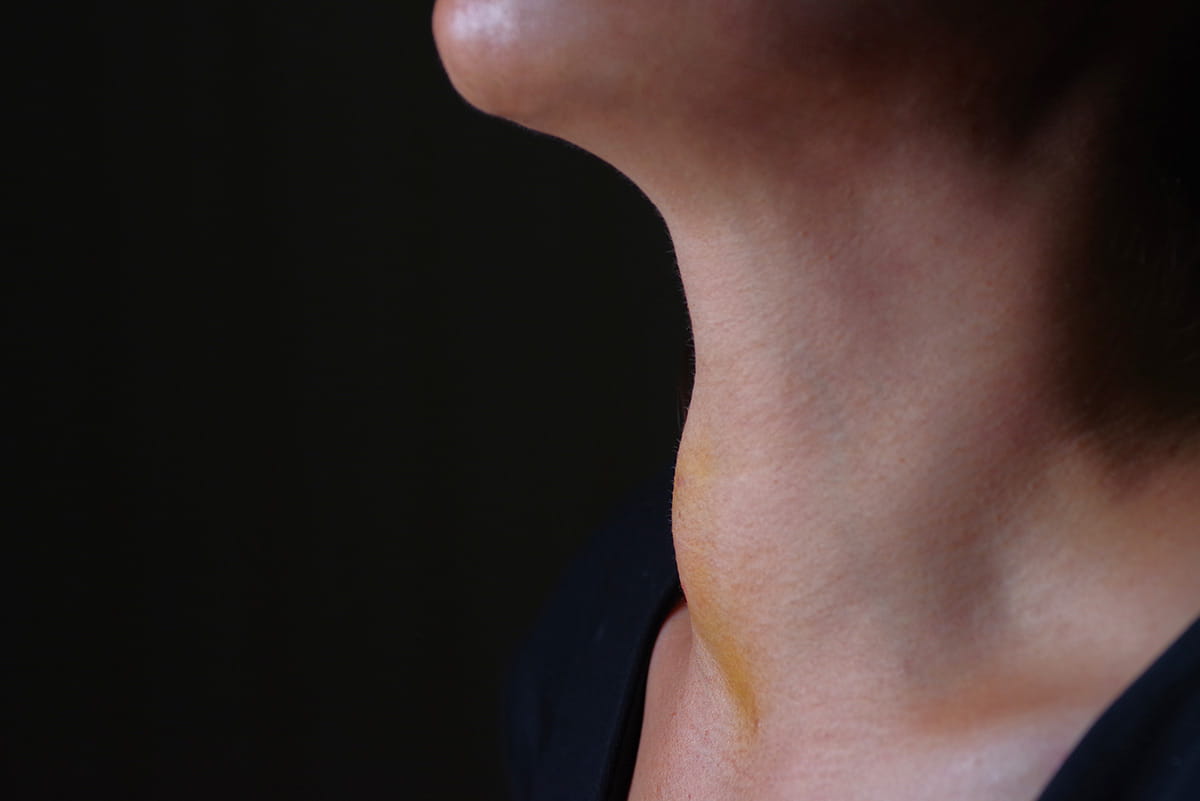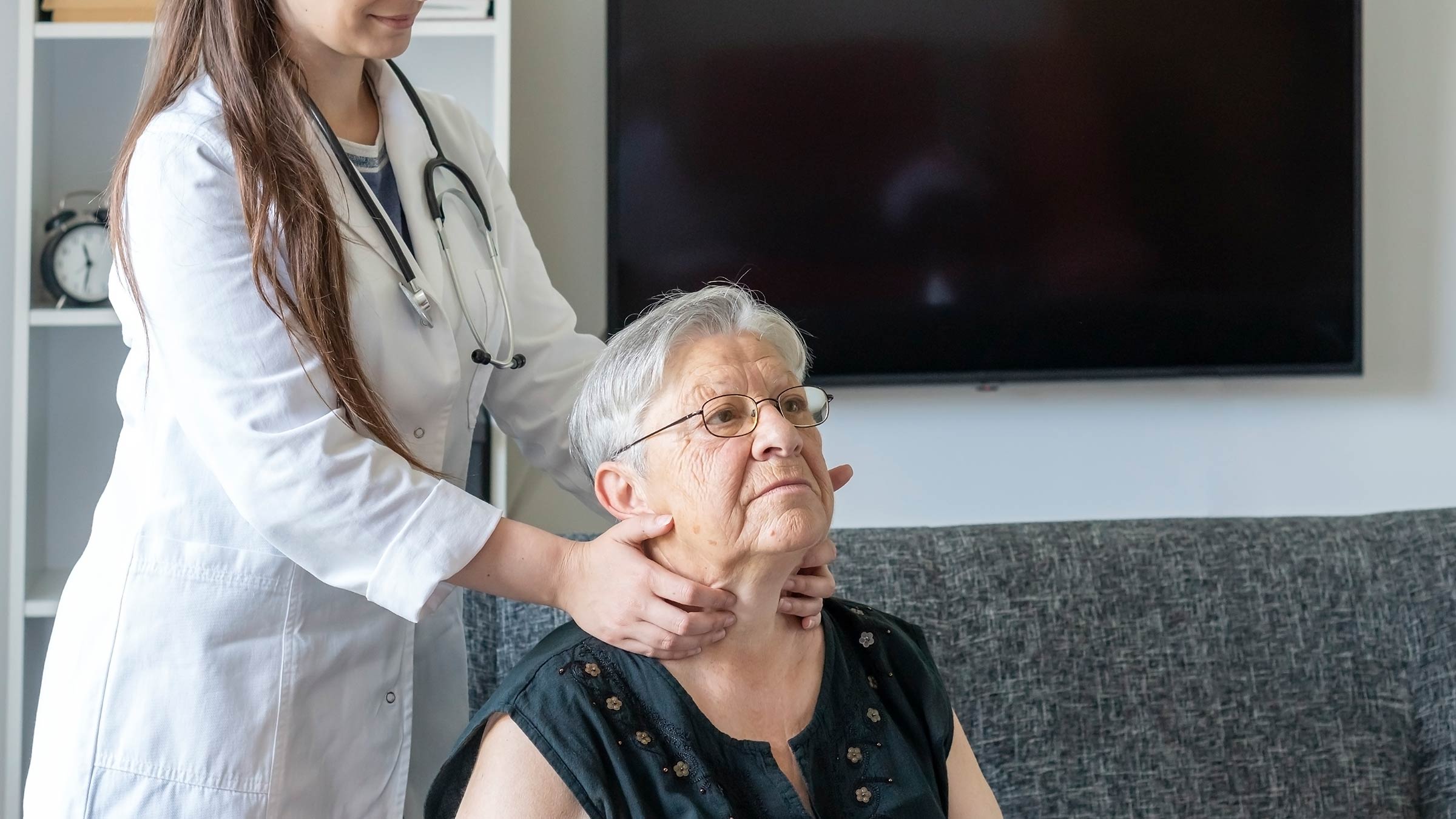Thyroid nodules, which are solid or fluid-filled lumps that form in the thyroid gland, are very common with more than 50% of the population developing one by the age of 60.
They’re generally benign, meaning they’re typically not cancerous and they usually don’t cause many symptoms. You may not even know you have one until your doctor discovers a nodule during a routine medical exam or an imaging scan for another health issue.
However, sometimes these mostly annoying lumps can turn into a real medical problem. If they grow too big, they can cause pain or difficulty swallowing. They can also cause the thyroid to produce too much of its hormone, leading to a condition called hyperthyroidism.
In rare cases (about 5% of the time), they can be cancerous.
When this common medical issue becomes troublesome, that’s when you’ll want to rely on the experts in endocrinology and oncology at The Ohio State University Wexner Medical Center and The Ohio State University Comprehensive Cancer Center – Arthur G. James Cancer Hospital and Richard J. Solove Research Institute.
We have ways of treating thyroid nodules that you won’t find other places in Columbus, Ohio, and we’ll be able to offer our expertise, whether the nodules are painful, cancerous or a cosmetic problem.
What exactly is a thyroid nodule and what causes it?

The thyroid gland is a butterfly-shaped gland in the neck just above the collarbone. It’s an important piece of anatomy as the thyroid hormones it produces help control many activities in your body.
The thyroid hormones impact heart rate, blood pressure, body temperature, how fast you burn calories and your overall metabolism, so we always want to make sure it’s functioning properly.
Occasionally, lumps, typically called nodules, can form in the thyroid.
Nodules in the thyroid are caused by:
- Overgrowth of normal thyroid tissue – We’re not sure why this happens, but it could be linked to genetics.
- Buildup of fluid – Sometimes cysts filled with fluid grow in the thyroid.
- Chronic thyroid inflammation – This can be caused by a thyroid disorder called Hashimoto’s disease.
- Tumors – These can be benign or cancerous.
- Multinodular goiters – Goiter refers to any enlargement of the thyroid, but sometimes distinct nodules form within the goiter.
- Iodine deficiency – This is rare in the United States.
Symptoms of a thyroid nodule
Many people are unaware they have nodules on their thyroid and only discover them during routine medical exams or imaging scans done for other health reasons.
However, sometimes the thyroid nodule will grow to a point where you can see it from the outside or feel it slightly on the inside.
Other symptoms of larger nodules include:
- Difficulty swallowing
- Pain or pressure near the nodule
- Cosmetic issues
- Voice changes
Hyperthyroidism means you have an overactive thyroid that produces too many hormones, affecting various functions.
Symptoms of hyperthyroidism include:
- Rapid heartbeat
- Weight loss
- Increased appetite
- Feelings of nervousness
- Difficulty sleeping
- Diarrhea or increased bowel movements
- Increased hair loss
Diagnosing a thyroid nodule
There are a number of tests that can help your doctor diagnose a thyroid nodule.
These same diagnostic tools will help rule out cancer as well as determine if your thyroid is functioning properly, which are both vital pieces of information.
Ways we diagnose a thyroid nodule include:
- A physical examination – Your doctor may be able to feel the nodule simply by placing hands on your neck while you swallow a few times.
- Ultrasound – A thyroid ultrasound uses high-frequency sound waves to pass through the skin and create an image of the nodule. Ultrasounds can distinguish between fluid-filled cysts and solid nodules as well as identify which ones are more likely to be cancerous.
- Thyroid scan – During this test, you’ll receive an injection of radioactive iodine and then a special camera will take pictures of your neck area. This test can help rule out cancer.
- Biopsy – Neither a scan nor an ultrasound can diagnose cancer, so if there is concern that the nodule is malignant, you might need a biopsy. During this procedure, your doctor will insert a needle into the lump and remove a sample of cells to be examined.
When evaluating thyroid disorders, it is customary to understand the function of the thyroid. Blood tests can determine if the thyroid is producing a normal amount (euthyroid), too little (hypothyroid), or too much (hyperthyroid) thyroid hormone.

When to worry about a thyroid nodule
Even though the vast majority (95%) of thyroid nodules are noncancerous, it’s important to talk to your doctor any time you feel a lump in your neck.
Your doctor will be able to evaluate it, monitor it and develop a treatment plan when necessary.
If cancer is suspected, your doctor can run tests to offer a definitive diagnosis. And just like with other types of cancer, the earlier it’s detected, the better the treatment outcomes.
Treating nodules in your thyroid
Treatment for your thyroid nodule will depend partly on whether or not you have symptoms as well as if it’s cancerous or not.
Possible treatments for thyroid nodules include:
- Watchful waiting – This is what typically happens if your thyroid nodule isn’t causing you symptoms or doesn’t bother you cosmetically. Your doctor will simply make note of it, its growth and whether it changes over time.
- Surgery – If the thyroid nodule is so large that it’s causing problems with swallowing or breathing, surgery to remove it might be recommended. This is also a standard course of treatment for nodules that are suspected or known to be cancer.
- Medications – If your thyroid isn’t functioning properly or producing the right amount of hormone, you may be prescribed thyroid medications to either increase the amount of thyroid hormone (if hypothyroid) or medications to decrease thyroid hormone (if hyperthyroid).
- Thyroid radiofrequency ablation – A new, minimally invasive procedure, this allows us to shrink or eradicate nodules by using a needle that heats and destroys the thyroid nodule tissue.
- Ethanol ablation – If a nodule is filled with fluid (a cyst), we can do this procedure, which involves removing the fluid and then injecting ethanol into the cyst to ensure it shrinks.
Why choose Ohio State for thyroid nodule treatment
We’ve been pioneers in thyroid, adrenal and other endocrine issues for decades. Highlights of our program include:
- Specialists who have made this their life’s work – We have a number of endocrinologists and oncologists who specialize in treating thyroid diseases, including highly experienced surgeons. They’re constantly on the cutting edge of discoveries, such as being the first in Columbus to offer radiofrequency ablation, that ultimately lead to better outcomes and care.
- A nationally recognized diabetes and endocrinology team – U.S. News & World Report has ranked Ohio State 36th in the nation for excellence in the treatment of diabetes and endocrine disorders.
- An integrative approach – You’ll receive an individualized treatment plan while also having direct access to medical expertise from across the Ohio State Wexner Medical Center, including our world-renowned cancer providers at OSUCCC – James.

